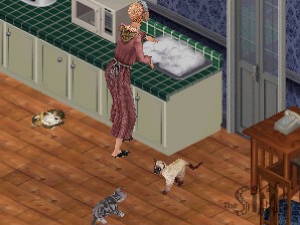Wednesday 9 October 2002

|
Pic of the day: Or you could grow old gracefully, surrounded by an ever increasing number of cats. (Screenshot from The Sims Unleashed.) Coming of (old) ageWhy do humans live so long? We are not the longest-living organism, or even animal; but compared to our size, we are exceptional. The smaller a mammal is, the faster is its metabolism: Its little heart beats faster, its lungs breathe more often. Digestion is faster, even gestation is rapid. After a short life, it dies. Meanwhile a large animal lives slowly: Its large heart beats as many times in an elephant's long life as a mouse's. The exception is the human: Our life span is that of an elephant, but we are definitely smaller. And the human heart beats four times as many beats before it gives up. Well, this is nice. But why? Is there a reason, or just the goodwill of God / evolution / random chance? Evolution definitely has a reason to reward human longevity. (Presumably a benevolent deity would come to a similar conclusion.) Unlike those other animals, we are able to keep a lot of knowledge in our large brains, and transmit them through speech. During its long childhood, a human learns a lot of both "how" and "why". And especially before writing was invented, they learned from grandparents and other people who lived a less hectic life than young hunters and gatherers. The village elders were the first libraries. Thus old age makes sense. Not just living long, but living long after losing the strength of youth. If humans had remained strong and fertile, they could have more children over a lifetime; but the children would be ignorant. Ignorance is risky; the young man without good tools and knowledge is little more than an ape who is bad at climbing. ***The reason for growing old seems to be gone now. Who wants to listen to the childhood memories of someone who don't even know how to send e- mail? And knowledge is not in short supply. We have far too much of it, even without the endless chattering of some elderly relative. No wonder then that people in their 40es no longer know what to do. Thus, midlife crises. The groundbreaking psychiatrist C.G. Jung remarked that Freud's sexual theory worked well with young patients, but mature people's crises were spiritual rather than sexual. This makes sense if we see the midlife crisis as a transformation rather than a malfunction: It is not the death of youth, but the birth of age. It is the chicken of the next life stage struggling free of its egg. It is natural that we are less focused on sex. The time for procreation is over, even though there is still some recreation to be had. Many modern men and even women panic and start doing desperate things in this area of life, trying to prove (at least to themselves) that they are still young. Which of course they aren't. If they are lucky, they are reconciled with their age before they lose too much of their existing life. Not all are so lucky; some alienate spouse, children and friends for life. It is natural that memories of the past well up and sometimes seem to crowd out the present. It need not be dementia come early; rather it could be nature's way of priming you for the job of bringing the past into the future. This task, remember, was why you were given these extra years. By rights you should die now, your genes safely tucked away in new bodies (either your own offspring or those of your close relatives). But you have been spared because you still have something to do. But something new; not more of the same. ***In a time where change is the one constant, is there still room for the elderly? And should they still accept this transformation, or are they right to cling to youth? I read today a throwaway comment in a book by Thomas Hylland Eriksen. He pointed out that the use of glasses seems to have spread just before the renaissance ... and speculates that the sudden cultural growth may come from scholars adding 20 more years to their career. At that time, scholars were few and far between, and nearly doubling their career could dramatically enhance the total volume of art and science. In our age, there may be plenty of scholars. But there are few sages. The wise elders who step back from the hurry and bustle of life, and look at the longer lines and the true values. Someone to act as a counterweight to the quick commercials and slogans. If the "baby boom" generation could become a generation of sages, then our civilization should reach heights undreamt of. The young ones today are more than our match in quickness of wit. But to reach their true potential, they must stand on the shoulders of giants. Will you at least consider such a fate? I sure would. Growing old, in my humble opinion, beats the alternative. |
Still cold, but a little above freezing. |
Yesterday <-- This month --> Tomorrow?